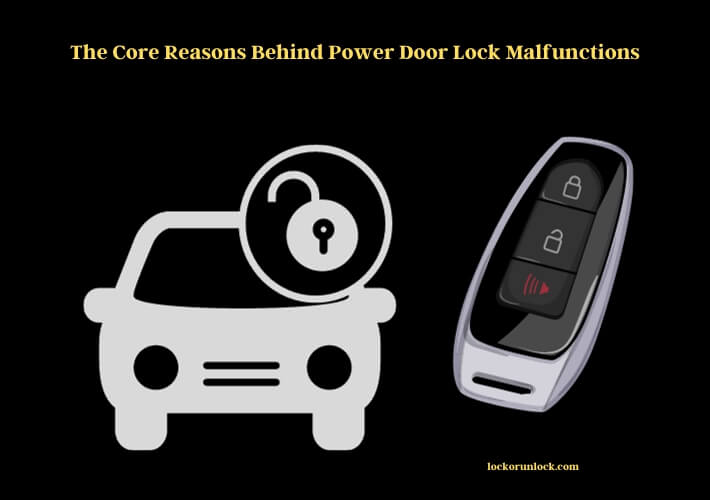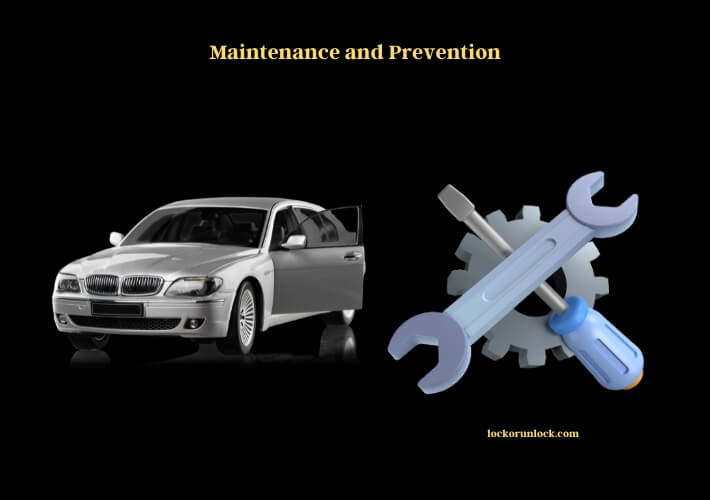Power door locks can malfunction due to various reasons. Common causes include faulty actuators, electrical issues, or damaged wiring.
Power door lock issues can be specific to one door or affect multiple doors. For instance, if the power lock is not working on just one door, it’s likely an issue with that specific door’s actuator. Similarly, if the problem is isolated to the passenger side or driver’s side, it indicates a localized problem. Electrical problems can also lead to power door locks working intermittently. Sometimes, you might hear the power locks clicking, but they won’t engage, suggesting a potential actuator malfunction or a weak electrical signal.

Resetting automatic door locks might require a specific procedure depending on the vehicle’s make and model. Always refer to the vehicle’s manual or consult a professional. If the car door lock doesn’t respond even with a key, it could be a mechanical issue within the lock mechanism. In cases where the power door locks operate sporadically, it’s essential to check for loose connections or damaged wiring. For those who find their car door refusing to lock manually, it’s often a sign of a worn-out or misaligned lock mechanism. Regular maintenance and timely repairs can ensure the longevity and functionality of power door locks.
What Causes Power Door Locks to Stop Working
The Basics of Power Door Locks
How Power Door Locks Function
Ever wondered how just a click on your car’s remote makes the doors lock or unlock? It’s all thanks to the intricate dance between electrical and mechanical components. The heart of this system is the actuator, a small motor turning electrical energy into motion to lock or unlock the door. It’s like a loyal butler, always ready at your service, making sure your car’s security is top-notch.
The Role of Actuators in Locking Mechanisms
Actuators are the unsung heroes of your car’s security system. Imagine having a personal security guard who jumps into action with a single press of a button. That’s your actuator for you! It’s a mix of electrical and mechanical genius, ensuring that your car doors lock tightly to keep intruders at bay and unlock swiftly to welcome you.
Electrical Concerns Affecting Door Locks
Wiring Issues and Their Impact
It’s like a well-rehearsed orchestra – every wire and connection playing its part. But what happens if one musician is out of tune? Chaos and confusion! Similarly, if wires are frayed or connections loose, your power door locks might just give you the silent treatment. It’s always wise to keep an eye out for any signs of electrical mischief!
Fuse and Relay Problems
Think of fuses and relays as the gatekeepers of the electrical currents flowing to your power door locks. Now, if the gatekeeper dozes off, the village is in trouble, right? Regular checks can ensure these vital components are always on their A-game, keeping your power door locks functioning like a charm.
Malfunctions Due to Battery Drain
A drained battery can be likened to a river running dry. Without the flow of energy, how will the boat (or in this case, the locks) move? Keeping the battery charged and healthy ensures that every click of your remote results in the satisfying sound of doors locking, keeping your car safe and sound.
Mechanical Failures in Power Door Locks
Wear and Tear Over Time
Everything ages, even your reliable car’s door locks. It’s akin to a warrior’s shield getting dents over years of battles. Regular maintenance is like the tender loving care that keeps the shield (your locks) ready to face another day, another challenge.
Misalignment of Locking Mechanisms
Imagine a key and a lock made for each other but separated by fate – dramatic, right? That’s what misalignment in locking mechanisms feels like. A regular check ensures that every lock and key (or actuator) are in perfect harmony, singing a song of safety and security.
Broken or Damaged Components
A castle is only as strong as its weakest brick. Similarly, a damaged component can compromise the security of your entire car. It’s like having a hole in the dam – it needs immediate attention unless you want the village flooded!
External Factors Leading to Malfunctions
Impact of Temperature and Weather
Ever noticed how doors stick in humid weather or locks freeze in the cold? It’s nature having a go at your car’s security. But fret not, for with the right care, your car can be prepared to brave the elements, come rain or shine!
Vandalism or Forced Entry Attempts
It’s like a fortress under siege – unwanted guests trying to force their way in. But a vigilant eye and timely upgrades can turn your car into an impregnable castle, where security is the reigning king!
Specific Door Lock Issues
Single Door Lock Failures
Isn’t it annoying when one soldier deserts the battalion? A single door lock failure can be just as frustrating. Regular checks and maintenance are akin to training sessions, keeping every soldier, or in this case, lock, in fighting fit condition.
Passenger Side vs. Driver’s Side Issues
It’s like having a reliable right hand and a left hand with a mind of its own. Addressing specific issues on either side requires a keen eye for detail and a knack for spotting the signs before they turn into full-blown problems.
Intermittent Locking Challenges
Imagine a watchman who’s alert one minute and snoozing the next. That’s your lock working intermittently. It needs a bit of TLC and perhaps a pep talk to get back to its vigilant self!
Troubleshooting and Solutions
Resetting Automatic Door Locks
It’s like rebooting a computer that’s gone haywire. Sometimes, all your car’s locking system needs is a reset to get back to its efficient, responsive self. It’s a fresh start, a clean slate, and a return to optimal performance.
Addressing Clicking Sounds Without Locking
A lock that clicks but doesn’t lock is like a guard who sounds the alarm but doesn’t stand guard. It’s a call for immediate action, a sign that your car’s security needs a thorough look to get back to its prime.
Manual Locking Difficulties
In a world of automation, manual locks are like the old guards, steadfast and reliable. But even they need a watchful eye and regular care to ensure they stand tall and strong, guarding your fortress (car) with unyielding resolve.
Maintenance and Prevention

Regular Check-ups for Longevity
It’s akin to a warrior sharpening his sword before battle. Regular check-ups ensure that every component of the locking system is ready to face the trials of time and wear, promising years of unwavering service.
Best Practices for Power Door Lock Care
Consider this the golden rules, the commandments, or the ultimate guide to ensuring that your car’s power door locks are always at their peak performance, ready to face the challenges of weather, wear, and tear.
How Does Spot Lock Technology in Trolling Motors Prevent Malfunctions Similar to Power Door Locks?
Spot lock technology in trolling motors uses advanced GPS and sensors to keep the boat in a fixed position regardless of wind, waves, or current. Similar to power door locks, it prevents malfunctions by continuously monitoring the boat’s location and making automatic adjustments to maintain precise positioning. This is how spot lock works.
FAQs
What Are the Primary Causes of Power Door Lock Failures?
Power door lock failures can arise from a myriad of reasons. The most common culprits include faulty actuators, which are the motors responsible for the lock’s movement. Electrical issues, such as damaged wiring or blown fuses, can also disrupt the function. Over time, mechanical components can wear out or become misaligned, leading to malfunctions. External factors like extreme weather conditions or attempted break-ins can also adversely affect the locks.
Why Is My Power Door Lock Working Intermittently?
Intermittent issues with power door locks often point to electrical problems. Loose connections, frayed wires, or even a dying car battery can cause inconsistent performance. It’s also possible that the actuator, the motor that drives the lock mechanism, is starting to fail. Regular maintenance checks can help identify and rectify these issues before they escalate.
Can Weather Impact My Car’s Power Door Locks?
Absolutely! Extreme cold can cause locks to freeze, making them unresponsive. On the flip side, very humid conditions might lead to swelling of the door frame, causing misalignment. This misalignment can put strain on the locking mechanism, leading to potential failures. It’s always a good idea to be aware of these environmental factors and take preventive measures.
What Should I Do If Only One Door Lock Isn’t Working?
If only one door lock isn’t functioning, the problem is likely localized to that specific door. The actuator of that particular door might be faulty or there could be an issue with the wiring connected to it. It’s best to get that specific door checked by a professional to pinpoint and address the exact cause.
Why Do I Hear a Clicking Sound But the Door Doesn’t Lock?
A clicking sound without the door locking indicates that the actuator is receiving the command to lock or unlock but is unable to execute the action. This could be due to a failing actuator, a weak electrical signal, or even a mechanical obstruction preventing the lock from moving. It’s essential to address this promptly as it’s a sign that the lock is not securing the vehicle.
How Can I Prevent Power Door Lock Issues?
Prevention is always better than cure. Regular maintenance checks can help identify potential problems before they become major issues. Keeping the locks clean, ensuring the battery is in good health, and checking the electrical components periodically can go a long way in preventing malfunctions. Also, being mindful of external factors like weather and potential vandalism can help in taking timely preventive actions.
Is There a Way to Reset My Car’s Automatic Door Locks?
Yes, many vehicles have a specific procedure to reset the automatic door locks. This process can vary based on the car’s make and model. It often involves a combination of turning the ignition on and off and pressing specific buttons on the remote. Always refer to the vehicle’s manual or consult a professional for the exact steps for your car.
Summary
Recap of Power Door Lock Challenges and Solutions
So, we’ve journeyed through the intricate world of power door locks, haven’t we? From the silent but efficient actuators to the vigilant gatekeepers – the fuses and relays, every component plays a pivotal role.
Emphasis on Preventative Measures and Maintenance
Remember, a stitch in time saves nine. Regular checks, timely maintenance, and a vigilant eye can ensure that your car’s power door locks are more like a fortress – impregnable, secure, and reliable. Who wouldn’t want that peace of mind?
